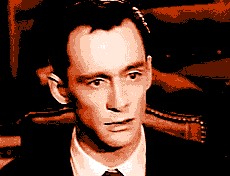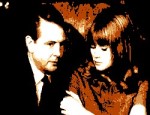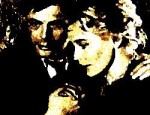Biography: life and films

After making his screen debut in a small role in Jacques Becker's Rendez-vous de Juillet (1949) Ronet took a break from acting. With his military service out of the way, he attended courses in philosophy and physics, whilst nurturing an ardent interest in the arts - notably music and painting. In 1950, he married the actress Maria Pacôme, who shared his interest in painting, but they divorced six years later. Acting was by now a secondary interest to the 25 year old Maurice Ronet, although he continued accepting small parts in films, notably Yves Allégret's La Jeune folle (1952) and Jean Dréville's Horizons sans fin (1953). His big break came in 1957 when debutant filmmaker Louis Malle gave him his first important role, playing opposite Jeanne Moreau, in Ascenseur pour l'échafaud. This was the first in a series of tragic roles that aligned perfectly with the actor's naturally melancholic persona, along with an obvious aura of vulnerability and sense of detachment from society. Ronet would be the ideal actor to portray the suicidal alcoholic in Louis Malle's subsequent masterpiece, Le Feu follet (1963), in which he gave what it is probably his finest screen performance.
A charismatic and sympathetic performer, Ronet was equally well suited to play alongside another rising star, Alain delon, in René Clément's Plein soleil (1960), an inspired adaptation of a Patricia Highsmith novel in which the actor ended up as the murder victim, a fate that befell him in many subsequent films. Delon would polish him off a second time in Jacques Deray's later thriller, La Piscine (1969). By the mid-1960s, Maurice Ronet was internationally renowned and became one of the most sought-after European actors of his generation. He made a memorable couple with Annie Girardot in Marcel Carné's sombre Trois chambres à Manhattan (1965), and in Jacques Doniol-Valcroze's La Dénonciation (1962) he was harrowingly convincing as a man overtaken by a destructive obsession. He was one of the few big name actors to be adopted by one of the directors of the French New Wave, namely Claude Chabrol. The two men collaborated on several films, notably La Ligne de démarcation (1966) and La Femme infidèle (1969) - and naturally Ronet ended up as the murder victim in at least one of them. Ronet also lent his talents to a number of action films - including Mark Robson's Lost Command (1966) - and made a flamboyant romantic lead in Michel Deville's Raphaël ou le Débauché (1971).
From the mid-70s, Maurice Ronet's acting career was in decline, but he continued making memorable appearances in such films as Georges Lautner's Mort d'un pourri (1977), again with Delon, and Bertrand Blier's Beau-père (1981). Ever since the start of his screen career, Ronet had harboured aspirations of becoming a film director. He got to realise this ambition in 1964, making his directorial debut with Le Voleur du Tibidabo. However, he only directed one other fictional feature for cinema, Bartleby (1976), although he was able to direct some programmes for television, contributing two episodes to the series Histoires extraordinaires in 1981.
Ronet's other keen interest was literature. He published a number of books, the first being L'île des dragons, in which he recounted his close encounter with Komodo dragons during an excursion to Indonesia - this also inspired him to make a documentary film, Vers l'île des dragons (1974). The other notable book he wrote was Le Métier de comédien. He made his final film appearance in Roger Vadim's Surprise Party (1983), which was released just one month after his death from cancer on 14th March 1983. Maurice Ronet was just 55 when he died - the sense of tragedy that adorns so many of his screen portrayals cruelly immitated by life. He now lies in a cemetery at Bonnieux in the Luberon region of southern France where he had his second home. He was survived by his second wife Josephine Chaplin (Charlie Chaplin's daughter), whom he married in 1980, and their son Julien Ronet.
© James Travers 2017
The above content is owned by frenchfilms.org and must not be copied.
Filmography
Click here to view complete list of films...The very best of the French New Wave

The very best of Italian cinema

The Golden Age of French cinema
